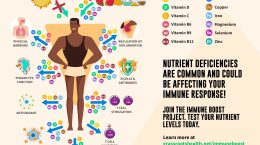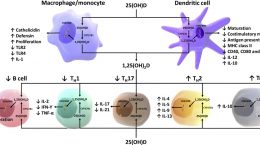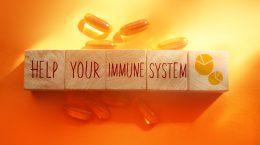Published on January 3, 2024
Colds, flu, and other respiratory illnesses abound this time of year – learn which nutrient deficiencies can hinder the immune response and how much of each might be needed to decrease susceptibility to illness
Key Points
- Vitamin D is one of the most important nutrients to stay on top of for our immune health, especially during the winter season; it is also important to pay attention to other nutrients, such as vitamin C and zinc, as reviewed here in detail
- Other immune-relevant nutrients include amino acids (such as glutathione and glutamine), antioxidants (such as vitamin E), phytochemicals (such as quercetin), omega-3 fatty acids, and iron
- Save 15% on the Immune Boost Panel Test Kit with code IMMUNE15 – Test your levels of vitamin D, omega-3s, magnesium, zinc, selenium, and others important measurements for immune health.
Order Now
 This is the time of year when upper respiratory illnesses, such as the cold, flu, and COVID, increase in incidence. Taking the necessary steps to maintaining a strong and healthy immune system can help determine whether or not illness affects us, or how severely we get sick if we do get infected.
This is the time of year when upper respiratory illnesses, such as the cold, flu, and COVID, increase in incidence. Taking the necessary steps to maintaining a strong and healthy immune system can help determine whether or not illness affects us, or how severely we get sick if we do get infected.
Save 15% on the Immune Boost Panel Test Kit with code IMMUNE15
Order Now
Vitamin D is one of the most important nutrients to stay on top of for our immune health, especially during the winter season; we previously highlighted the many roles of vitamin D in the immune response. It is also important to pay attention to other nutrients, such as vitamin C and zinc, as was the focus on a review published by Maggini et al.
“There is A Close Relationship between Nutritional Status and Immune Function”
The authors state quite wonderfully, “There is a close relationship between nutritional status and immune function. Hence, immunocompetence can be regarded as a measure of adequate nutrition.” While there are certainly other nutrients that play major roles in immune system function, the authors chose to look at vitamins C, D and zinc, and their synergistic, central roles in how the immune system responds to upper respiratory tract infections, as well as how those roles are challenged by other influencing factors.
Vitamin C
Vitamin C has been noted in many studies to have a positive effect on upper respiratory infections, including decreasing the duration and severity of symptoms. It is known to be essential to a healthy immune response in the following ways:
- It is required for the synthesis of collagen, which helps keep the epithelial barriers (skin, lungs, etc.) strong
- Specific white blood cells rely on vitamin C to help stimulate their function
- The antioxidant activity of vitamin C is needed to counteract extremely high levels of oxidative stress that result from the inflammatory response, which can damage healthy cells and their proper immune response
Vitamin D
In our previous posts about vitamin D and the immune system, we describe in detail the role that vitamin D plays in the body’s initial defense against a pathogenic invasion as well as its complex role within the adaptive immune system, tying both together to clearly illustrate the full significance of vitamin D to immunity. In summary:
- Vitamin D allows immune cells and epithelial cells (such as those in the lungs and gastrointestinal tract) to increase their production of antimicrobial peptides, regulate certain immune cells, and reinforce the physical barrier for better response against infections; this is especially true for the airway epithelial cells in response to a viral infection
- Vitamin D is needed by certain white blood cells to help them recognize, bind to, and destroy pathogens in the body (through processes called chemotaxis, autophagy and phagocytosis)
- Vitamin D influences the gut microbiota and helps it maintain its immune modulating effects
- Vitamin D is needed to activate T cells, turning naïve T cells into primed T cells that are better able to respond to a pathogen, such as viruses
- Vitamin D influences T cell differentiation to induce lower levels of inflammatory cytokines and higher levels of anti-inflammatory cytokines
Zinc
According to the authors, “impaired immune functions due to inadequate zinc status may be the most common cause of secondary immunodeficiency in humans.” Zinc deficiency impairs the capacity of many different immune cells to carry out their functions. Some of zinc’s roles within the immune system include:
- Zinc is a necessary co-factor for the development and function of many different types of immune cells, including macrophages, neutrophils, natural-killer cells, and T cells
- Zinc is necessary for signaling between the cells of the immune system, so that specific cells can know what specific actions to take in response to a stimulus
- Zinc has anti-inflammatory and antioxidant properties
- Studies have shown that zinc may reduce the risk and duration of infections such as pneumonia, the common cold, and the flu, especially in children and the elderly
Nutrient Deficiencies Compromise Immune Health
Getting enough of certain nutrients is especially important to our immune system, as both the innate and adaptive immune responses rely on these nutrients in order to function properly, as illustrated in the following diagram.
Each of these nutrients assist the body in performing specific actions within the immune system, reviewed in detail in this blog.
The following protocol is a summary of several of these nutritional supplements that can be taken safely on a daily basis to help boost the integrity of our immune systems, help shield us from infection if we are exposed, and additionally, improve our immune response to minimize the risk of severe outcomes if we are infected.
Protocol for Staying Healthy by Promoting a Strong Immune System
Vitamin D: Typically, most individuals need to take between 4,000 to 10,000 IU of vitamin D on a daily basis to maintain a vitamin D level in the 40-60 ng/ml (100-150 nmol/L) range. Learn what supplement amount is needed for you by measuring your vitamin D level and using vitamin D*calculator.
Vitamin A (as retinol): 2,000 to 4,000 IU per day for all elderly, adults and adolescents
Vitamin C: 1,000 to 3,000 mg per day, in divided doses, along with a quercetin supplement
Selenium: 100-200 ug per day for elderly, adult, and adolescents, with a suggested serum level of 130-150 ug/L (measure your selenium level as part of the Elements Panel test kit)
Zinc: 10-20 mg per day
Additional supplements to support vitamin D and overall immunity:
Magnesium: 400 mg per day on average
Vitamin K: suggested intake of between 180-200 mcg MK7 (a form of vitamin K2) per day from diet and supplements
Other Key Nutrients worth Noting
Nutrients work synergistically with each other, and the authors of this paper felt that several other immune-relevant nutrients deserved mention. These include amino acids (such as glutathione and glutamine), antioxidants (such as vitamin E), phytochemicals (such as quercetin), omega-3 fatty acids, and iron.
Save 15% on the Immune Boost Panel Test Kit with code IMMUNE15 – Test your levels of vitamin D, omega-3s, magnesium, zinc, selenium, and others important measurements for immune health.
Order Now
Don’t Forget the Sunshine!
Those who follow GrassrootsHealth are especially aware of the importance of vitamin D and sensible sun exposure to our health, for reasons including the production of vitamin D, nitric oxide, beta-endorphins, melatonin, and other health-benefiting reactions that are stimulated by exposure to sunlight.
Are You Getting Enough Vitamin D & Other Health Boosting Nutrients?
Measuring our levels of vitamin D and other important nutrients and health markers can be considered one way to check-in with our health status and guide us towards the steps to take next in improving and supporting our health.
 Having and maintaining healthy vitamin D levels and other nutrient levels can help improve your health now and for your future. Choose which to measure, such as your vitamin D, omega-3s, and essential minerals including magnesium and zinc, by creating your custom home test kit today. Take steps to improve the status of each of these measurements to benefit your overall health. You can also track your own intakes, symptoms and results to see what works best for YOU.
Having and maintaining healthy vitamin D levels and other nutrient levels can help improve your health now and for your future. Choose which to measure, such as your vitamin D, omega-3s, and essential minerals including magnesium and zinc, by creating your custom home test kit today. Take steps to improve the status of each of these measurements to benefit your overall health. You can also track your own intakes, symptoms and results to see what works best for YOU.
Enroll and test your levels today, learn what steps to take to improve your status of vitamin D (see below) and other nutrients and blood markers, and take action! By enrolling in the GrassrootsHealth projects, you are not only contributing valuable information to everyone, you are also gaining knowledge about how you could improve your own health through measuring and tracking your nutrient status, and educating yourself on how to improve it.






